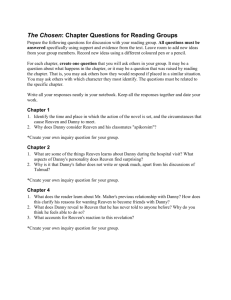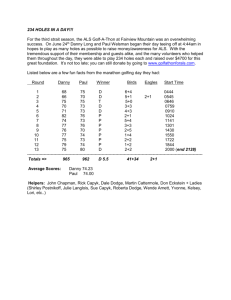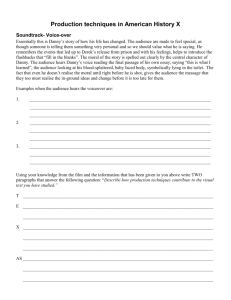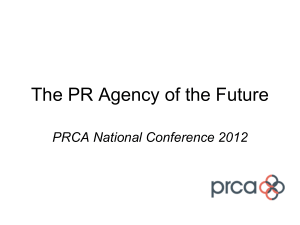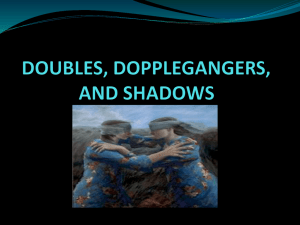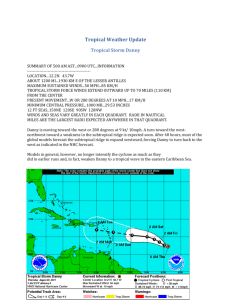The Chosen - Penguin Random House
advertisement
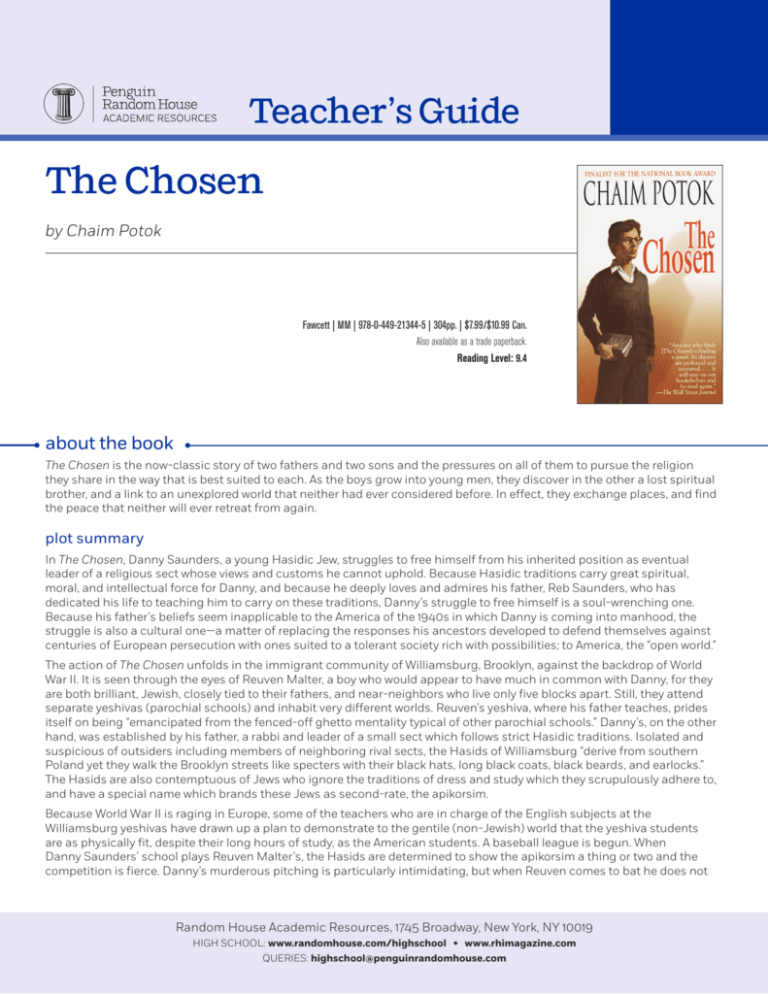
Teacher’s Guide The Chosen by Chaim Potok Fawcett | MM | 978-0-449-21344-5 | 304pp. | $7.99/$10.99 Can. Also available as a trade paperback. Reading Level: 9.4 about the book The Chosen is the now-classic story of two fathers and two sons and the pressures on all of them to pursue the religion they share in the way that is best suited to each. As the boys grow into young men, they discover in the other a lost spiritual brother, and a link to an unexplored world that neither had ever considered before. In effect, they exchange places, and find the peace that neither will ever retreat from again. plot summary In The Chosen, Danny Saunders, a young Hasidic Jew, struggles to free himself from his inherited position as eventual leader of a religious sect whose views and customs he cannot uphold. Because Hasidic traditions carry great spiritual, moral, and intellectual force for Danny, and because he deeply loves and admires his father, Reb Saunders, who has dedicated his life to teaching him to carry on these traditions, Danny’s struggle to free himself is a soul-wrenching one. Because his father’s beliefs seem inapplicable to the America of the 1940s in which Danny is coming into manhood, the struggle is also a cultural one—a matter of replacing the responses his ancestors developed to defend themselves against centuries of European persecution with ones suited to a tolerant society rich with possibilities; to America, the “open world.” The action of The Chosen unfolds in the immigrant community of Williamsburg, Brooklyn, against the backdrop of World War II. It is seen through the eyes of Reuven Malter, a boy who would appear to have much in common with Danny, for they are both brilliant, Jewish, closely tied to their fathers, and near-neighbors who live only five blocks apart. Still, they attend separate yeshivas (parochial schools) and inhabit very different worlds. Reuven’s yeshiva, where his father teaches, prides itself on being “emancipated from the fenced-off ghetto mentality typical of other parochial schools.” Danny’s, on the other hand, was established by his father, a rabbi and leader of a small sect which follows strict Hasidic traditions. Isolated and suspicious of outsiders including members of neighboring rival sects, the Hasids of Williamsburg “derive from southern Poland yet they walk the Brooklyn streets like specters with their black hats, long black coats, black beards, and earlocks.” The Hasids are also contemptuous of Jews who ignore the traditions of dress and study which they scrupulously adhere to, and have a special name which brands these Jews as second-rate, the apikorsim. Because World War II is raging in Europe, some of the teachers who are in charge of the English subjects at the Williamsburg yeshivas have drawn up a plan to demonstrate to the gentile (non-Jewish) world that the yeshiva students are as physically fit, despite their long hours of study, as the American students. A baseball league is begun. When Danny Saunders’ school plays Reuven Malter’s, the Hasids are determined to show the apikorsim a thing or two and the competition is fierce. Danny’s murderous pitching is particularly intimidating, but when Reuven comes to bat he does not Random House Academic Resources, 1745 Broadway, New York, NY 10019 HIGH SCHOOL: www.randomhouse.com/highschool • www.rhimagazine.com QUERIES: highschool@penguinrandomhouse.com Teacher’s Guide: The Chosen back away. A hard ball shatters his glasses and smashes into his eye, sending him to the hospital for a week. At his father’s insistence, Reuven permits the repentant Danny to visit him, and they become friends. Danny dazzles Reuven with demonstrations of his photographic mind, with the quantity of scholarly work he bears each day, and with the intellectual prowess of his English and Hebrew studies—qualities greatly revered in traditional Jewish culture. Danny’s revelations startle Reuven; he confesses he would rather be a psychologist than accept his inherited role as spiritual leader of his father’s sect. Reuven’s confessions surprise Danny; he reveals his desire to become a rabbi, though his scholar-father would prefer him to follow his talent and become a mathematician. Danny cannot understand how anyone would choose the very position he secretly wishes to reject. At a time when conflicts are churning within him, Danny finds a needed confidante in Reuven, an empathetic listener who is highly intelligent yet safe—not a Hasid, but a Jew who follows orthodox religious traditions without rejecting the secular possibilities in the world around them. As the boys become friends, Reuven begins to learn about Hasidism. Though he scoffs at its narrowness, his father tells him he must understand its origins if he is to appreciate the turmoil his new friend is experiencing. For it is in the Slavic countries of Eastern Europe, Mr. Malter explains to Reuven, that his friend’s “soul” had been born. First there were centuries of persecution—Jews fleeing from Germany to Poland in the thirteenth century, academies set up, an economy built— until in the seventeenth century the Jewish community in Poland began to flourish. But one hundred years later it was nearly destroyed at the hands of the Polish Cossacks, and it was at this point that Hasidism began. The Hasidim lived shut off from the rest of the world; whatever was not Jewish and Hasidic was forbidden. Many separate sects emerged, each with its own spiritual leaders whose every word was considered to be holy. These leaders, or tzaddiks, were believed to be superhuman links between the people and God. In some sects it was believed that a leader should take upon himself the sufferings of the Jewish people, for their sufferings were so great they would be unendurable if their leaders did not somehow absorb these into themselves. Such a leader is Reb Saunders. His ways and his teachings are the ways of seventeenth century Hasids and it is this role that Danny is expected to fill when he becomes the tzaddik. In the long and uncomfortable initial visits that Reuven pays to Reb Saunder’s congregation to be approved as fit company for Danny, Reuven observes the way Hasidic philosophy permeates his friend’s life: “The world kills us!” Reb Saunders instructs his congregation, “The world laughs at Torah! And if it does not kill us, it tempts us! It misleads us! It contaminates us! It asks us to join in its ugliness, its impurities, its abominations! It is not the world that is commanded to study Torah, but the people of Israel! We are only half alive in this world! Half alive!” As Reuven listens to this outpouring he thinks, “I didn’t agree at all with his notions of the world as being contaminated. Albert Einstein is part of the world . . . President Roosevelt is part of the world. The millions of soldiers fighting Hitler are part of the world.” But this view is the one that Danny, with all his brilliance and all his intellectual curiosity, is going to have to promulgate when he becomes leader of a congregation. Reuven’s father finds this world view equally appalling. Weeks before the accident which brings the two boys together, Mr. Malter meets Danny in the public library and begins to guide him in his search for knowledge of the world through the “forbidden books” prescribed by his father. Mr. Malter tells Reuven of Danny’s brilliant mind, his insatiable appetite for learning, the amazing speed with which he digests information. “It is a shame that a mind such as Danny’s will be shut off from the world,” he laments, and justifies giving Danny books to read “behind his father’s back” by explaining, “Danny would have continued to read anyway on his own. At least this way he has some direction from an adult.” Mr. Malter and Reb Saunders are, in some ways, antithetical characters. Passionately involved in the world the Hasid defines as “the world that kills,” Mr. Malter’s widely published articles, his commitment to teaching, his political activism on behalf of the establishment of a Jewish state in Palestine, and his continual discussions with his son are in direct opposition to Reb Saunders’ sanction against writing (publishing is forbidden to a Hasid, only discussion of the Talmud is permitted); his opposition to the state of Israel, a state that does not follow God or Torah, and therefore a desecration; and his method of raising his son “in silence,” speaking only when they are studying Talmud. When the Germans surrender and the existence of the concentration camps becomes known for the first time, the two men’s reactions are characteristic. For Mr. Malter, overwhelming grief 2 Teacher’s Guide: The Chosen is followed by a determination to counter the senseless suffering of the millions who died with something meaningful: the creation of the state of Israel. “There is so much pain in the world. What does it mean to suffer so much if our lives are nothing more than the blink of an eye? A man must fill his life with meaning; meaning is not automatically given to life.” His life comes to revolve around two ideas: educating American Jews and helping to make a Jewish state a reality. “We have a terrible responsibility,’” Mr. Malter tells Reuven, “We must replace the treasures we have lost . . . Six million of our people have been slaughtered. It will have meaning only if we give it meaning.” “Ah, how the world kills us!” Reb Saunders exclaims when he learns of the concentration camps, “How the world drinks our blood. It is the will of God. We must accept the will of God!” Anguish and suffering are his response to the holocaust. Acceptance of God’s will is the only action he knows how to take. While Reb Saunders suffers, Danny struggles to educate himself in the ideas of Freud and in the problems of contemporary Judaism. He combines the double load of schoolwork and the rigorous study of Talmud which forms the basis of his relation to his father, with his own attempts to educate himself in his quest for identity. Reuven, too, is seen to spend many hours of his day in study. There is a passion for learning in these two characters, one that is shaped by the religion itself. To study Talmud is to engage in scholarly work, the novel shows. There are lines of religious text and there are commentaries written by the various rabbis whose opinions are included in Talmud. Often these opinions contradict one another; it is not a question of finding a “right answer,” but of asking the right questions. Each father tests his son’s acumen by a series of questions which demand careful responses and a great deal of preparation. Each father, Hasidic rabbi or free-thinking scholar, finds joy in the knowledge that his son will surpass him in scholarly achievements. It is his passion to know, to know the world and to know himself that ultimately leads Danny to reject Hasidism. He comes to see that the world of his father is too restricted; he begins to feel trapped. At the same time, the respect and love he feels make it terribly difficult for Danny to disregard the ties that bind him to his father’s way of life. “I don’t know what he’s trying to do to me with this weird silence that he’s established between us, but I admire him. I think he’s a great man. I respect him and trust him completely, which is why I think I can live with his silence. And I pity him, too. Intellectually, he’s trapped. He was born trapped. I don’t ever want to be trapped the way he’s trapped . . . It’s the most hellish, choking, constricting feeling in the world. I scream with every bone in my body to get out of it. My mind cries to get out of it.” The novel begins with Danny and Reuven as high school boys and concludes with their graduation from college. Danny has decided to get out of the life that imprisons him; he will take off the clothing and shun the trappings of the Hasid, go on to graduate school, and become a psychologist. When he has resolved to do this, Mr. Malter tells him he must prepare the things he will say to his father very carefully for Danny’s decision has deep repercussions: An arranged marriage will have to be broken, the inheritance of spiritual leadership will go to Danny’s sickly younger brother, the tradition of six generations will have been broken, and Reb Saunders will have lost to the world he hates and fears the son he most treasures. Before Danny can confront his father, however, his father confronts him. Using Reuven as a foil through whom to speak to his son, Reb Saunders reveals that he knows his son will not become a rabbi. “I know . . . I have known it for a long time.” “This is America,” Reb Saunders explains, “Not Europe but an open world. Here there are libraries and books and schools. Here there are great universities that do not concern themselves with how many Jewish students they have. I knew already that I could not prevent [Danny’s] mind from going into the world for knowledge. I knew in my heart that it might prevent him from taking my place. I had to make certain his would be the soul of a tzaddik no matter what he did with his life.” And so Reb Saunders reveals his plan was not merely to train Danny to take his inherited position, but rather to pass along the tradition of the tzaddik so that if Danny chose to reject the old world, he would be prepared to enter the new one with a compassionate soul, not merely with a brilliant uncaring intellect. “One learns the pain of others by suffering one’s own pain,” Reb Saunders explains, “By turning oneself inside out . . . by finding one’s own soul. And it is important to know of pain . . . It destroys our self pride, our arrogance, our indifference towards others. And of all people a tzaddik especially must know of pain. A tzaddik must know how to suffer for his people. He must take the pain from them and carry it on his own shoulders.” It is for this end that Danny has been 3 Teacher’s Guide: The Chosen raised “in silence.” And although Danny has decided to reject many aspects of his upbringing, he tells the Malters that he is prepared to raise his own son in silence, “If I cannot find another way.” Reb Saunders’ pain is made evident at the novel’s conclusion. He has recognized his own limitations as Danny’s teacher and has seen the Malters, both father and son, as a blessing: worthy guides for Danny in his period of crisis, able to integrate Danny into the America he himself is cut off from, and compassionate individuals in their own right, an essential feature in a teacher. He can accept his son’s decision, having seen the agony Danny has experienced in his choice. “I do not see his books? I did not see the letters from the universities? I do not see his eyes? I do not hear his soul crying? Let my Daniel become a psychologist. I have no fear now. All his life will be a tzaddik. He will be a tzaddik for the world. And the world needs a tzaddik.” In The Chosen younger readers will naturally identify with Danny’s struggle; they will celebrate his “festival of freedom” with all its attendant pain. With the narrator, Reuven Malter, they will find it difficult if not impossible to understand Reb Saunders’ methods or his objectives, but it is interesting and very moving to read the last chapter in which so much of Reb Saunders’ conflict and pain is given voice. In a sense we come to see how much the two fathers of this novel share; how they value similar qualities in their sons: intelligence, intellectual achievement, compassion. And although for Reb Saunders, compassion is viewed as the ability to suffer, to internalize the pain which has always surrounded Jews in the world, for Mr. Malters it is not enough to suffer; suffering must be wedded to work, to action which will redeem the meaningless of the evil that is always in the world. It is this work which Danny comes to seek, which he chooses, not freely, but with great anguish as he breaks the tradition that demands he become a tzaddik for a small community of Jews and establishes a new role for himself as tzaddik for the world. discussion and writing comprehension & discussion questions book I chapter 1 1. Identify the time and place in which the action of the novel is set, and the circumstances that cause Reuven and Danny to meet. 2. Why does Danny consider Reuven and his classmates “apikorsim”? chapter 2 1. What are some of the things Reuven learns about Danny during the hospital visit? What aspects of Danny’s personality does Reuven find surprising? 2. Why is it that Danny’s father does not write or speak much, apart from his discussions of Talmud? chapter 4 1. What does the reader learn about Mr. Malter’s previous relationship with Danny? How does this clarify his reasons for wanting Reuven to become friends with Danny? 2. What does Danny reveal to Reuven that he has never told to anyone before? Why do you think he feels able to do so? 3. What accounts for Reuven’s reaction to this revelation? book II chapter 6 1. What does Reuven learn from his father about the following aspects of Jewish history: • how the Jews came to function as buffers in seventeenth century Poland • the Cossack uprising in 1648 and its affect on the Jewish community • Ahabbtai Svi • Israel and his teachings • the Hasidim and their belief in a “superman” 2. Why do certain Hasids believe their leaders must take the sufferings of the Jewish people upon themselves? 4 Teacher’s Guide: The Chosen 3. Why does Mr. Malter believe it is natural for Danny to break his father’s rules and read forbidden books? 4.What does Mr. Malter tell Reuven about Danny’s need for a friend? chapter 7 1. How does the author demonstrate the way in which the Hasidic community reveres Danny? 2. What are Reb Saunders’ views on: A) the world and what it does to Jews, B) life on earth, and C) the study of the Torah? 3. Explain Reb Saunders’ assertion that “we are only half alive in this world.” 4.How does Reb Saunders determine whether Reuven is fit to be his son’s friend? chapter 8 1. How does Mr. Malter justify providing books for Danny which his father and Hasidim forbid him to read? 2. Under what circumstances do Danny and his father communicate? How is the explanation for this aspect of their relationship given? 3. How is the study of the Talmud shown to be a central activity in the lives of both Reuven and Danny? chapter 10 1. What is the subject of Danny’s “forbidden” interest? What is it he is trying to learn about in this study? chapter 11 1. How does the author convey the information that Americans did not know about the German concentration camps until after Germany had surrendered? 2. What is Reb Saunders’ reaction to this terrible revelation? Compare it to Mr. Malter’s. 3.How does the author convey Danny’s increasing sense of being trapped by his father’s way of life? book III chapter 13 1. Discuss the reactions of Mr. Malter and Reb Saunders to the establishment of a Jewish homeland in Palestine. Tell what each does and says with his grief. 2. Discuss Mr. Malter’s assertion, “A man must fill his life with meaning. Meaning is not automatically given to life.” 3. What causes Reuven and his father to be “excommunicated” from the Saunders family? How does Danny react? chapter 14 1. What does Reuven understand about his teacher, Rev Gershenson, when he is unable to find his name listed in either the Hebrew or English catalogues of his college library? 2. Why do Reuven and his father “weep with joy” when the United Nations votes to accept the Partition Plan? What does this mean for Mr. Malter in particular? 3. Describe the method Reuven uses to study the nine lines of text he is certain Rev Gershenson will question him on. 4. What does Rev Gershenson admit about the passage of Talmud he has asked Reuven to explain and about the way Reuben has attempted to explain it? chapter 15 1. Why does Danny now resume his friendship with Reuven? What does this show about his ties with his father? 2. What advice does Mr. Malter give Danny about telling his father he has decided to become a psychologist? Why is this such a significant decision? What are its possible consequences? chapter 18 1. What do you learn about Reb Saunders’ own childhood and of his objective in raising Danny? 2. Why does Reb Saunders accept his son’s decision “without fear”? 3. What does it mean that all his life Danny will be “a tzaddik . . . a tzaddik for the world”? 4. For what and of whom does Reb Saunders ask forgiveness? In what ways does Reb Saunders’s reaction surprise you? How had you expected him to react? 5 Teacher’s Guide: The Chosen 5. What does it reveal about Danny that he has decided he will raise his own son “in silence”? 6. What is it that Reb Saunders says he has understood all along about Danny? How is this related to his gratefulness to Reuven and his father? composition 1. Compare and contrast the characters of Reb Saunders and Mr. Malter: • as fathers • as teachers and in terms of: • their world views • their views of Judaism • their views of Zionism Use significant quotes from the book to support your judgments. 2. Keep a record of all the historically significant events which unfold during the action of the novel. 3. Discuss the significance of the book’s title. Brainstorm to discover how many ways the title can be applied to characters and situations in Potok’s novel. 4.Analyze the Hasidic practice of bringing up a child “in silence.” What is the purpose and the effect of this practice? Discuss its effect on Danny and divide the class into two groups: one whose role is to defend Danny’s upbringing; the other whose role is to criticize it. Debate the issue as Reb Saunders and Mr. Malter might have, had they come face to face. Use the text as a reference. 5. Discuss the role of female characters in The Chosen. What accounts for their discernible lack of influence in the book? Was this deliberate on Potok’s part? Use evidence from the novel to support your view of this question. 6. Although they are both practicing Jews, there is much in Danny’s upbringing Reuven does not understand or approve of. Pair the class into sets of “Reuvens” and “Dannys.” Have each Reuven draw up all his questions about and objections to the way his friend is being raised. Have each Danny draw up a response to this. Then arrange a whole class forum where both the objections and responses can be aired. 7. Talk about the process of identification which occurs between the reader and character. Have the class talk about ways in which they were able to identify with the characters in The Chosen. Discuss the universal nature of the conflict between parent and child and its role in literature. Ask for books your students have read in which this conflict is apparent. 8. What do you believe to be the three most important ideas contained in The Chosen? In an essay, discuss each one referring directly to instances in the book to support your beliefs. After doing so, rank each idea in order of importance. 9. Identify the speakers of the following quotations. Then explain their significance to the novel, referring to characters and incidents throughout your discussion: • ”A father can bring up a child any way he wishes...” • ”What a price to pay for a soul!” 10. In essay form, discuss five significant historical events which occur during the action of The Chosen, and show their effect upon the Malter and Saunders families. 11. Write a character study of Reb Saunders using evidence from the book to discuss his childhood; his adulthood; his identity as a rabbi, a “tzaddik,” a father. 12. How did reading The Chosen add to your knowledge of Judaism, its history, religious beliefs and practices, its cultural values? Write quickly, listing everything you can recall. Then discuss in detail how the book clarified or corrected your previous beliefs about Judaism and include any surprises you derived. 13. Assume you are Danny Saunders keeping a private diary. Select four key moments of crisis that span the time frame of the novel, and write an entry for each of those dates. Use your own experience of how it feels to be in conflict with yourself, with your parents or with your society to fuel your memory, but keep to Danny’s beliefs and values while writing. 14. In an essay, discuss the values and beliefs of Reb Saunders and Mr. Malter, and show how the novel dramatizes the affect these had on the development of Danny and Reuven. Then analyze your own parents’ values and beliefs, exploring the way they have shaped, and are 6 Teacher’s Guide: The Chosen continuing to shape, your identity. 15. Reuven’s father tells him, “The Talmud says that a person should do two things for himself. One is to acquire a teacher.” Danny remembers that the other is to choose a friend. In what ways have both Danny and Reuven done these things for themselves? What has each boy derived from the teacher? From the friend? vocabulary define and discuss the following terms: Hasid: Member of a Jewish sect who follows the religious and social precepts set down in the 17th century. Yiddish: A language spoken by Jews since the Middle Ages. Its components are Hebrew, German, and Slavic. assimilationist: One who adopts the practice of a prevailing culture. fanatic: Rigorous believer. Talmud: In Hebrew, the word for “teachings.” Applied to the collection of academic discussion and judicial administration of Jewish law written by generations of scholars over hundreds of years. apikorsim: An unbeliever or skeptic. One who does not adhere to Jewish religious belief or practice. rabbi: Religious leader and head of a congregation. Cossacks: Polish soldiers who, under the leadership of Chmielnicki, annihilated hundreds of Jewish communities in 1648, killing hundreds of thousands of people. tallit: Hebrew prayer shawl worn by adult males. tefillin: Two small black boxes fastened to leather straps, containing parts of the Torah and worn during morning prayer. shofar: Ram’s horn blown at various religious services. the Kaballah: Books of Jewish mysticism. tzaddik: According to Hasidism, a pious leader who is the intermediary between God and man, the “soul of the world.” Torah: The written law given to Moses at Mount Sinai, including the Talmud and related commentaries. gematriya: A method of interpreting a biblical word based on the numerical value of its letters in the Hebrew alphabet. misnaged: Opponents of the Hasidic movement who criticize belief in the tzaddik. Teresienstadt: The name of a German concentration camp. goyim: The Hebrew word for non-Jews. Zionism: The movement to secure the return of the Jewish people to Palestine. bar mitzvah: The ceremony marking the initiation of a 13-year-old boy into adulthood and the Jewish religious community. about this guide’s writer ROSALYN MCPHERSON ANDREWS is founder of McPherson Andrews Marketing, an educational marketing consultant firm. In addition to researching and developing school materials, she has taught at the junior high and college levels. 7
